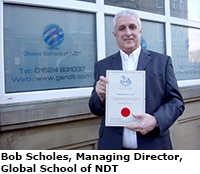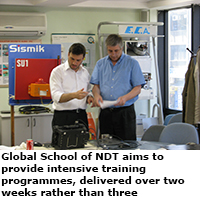Global School of NDT achieves BINDT ATO and PCN AQB status
03/03/2014
Global School of NDT has announced that it has obtained ATO status with BINDT and AQB with PCN for its ultrasonic phased array Level II courses and examinations. This is the first of many exciting accreditations that the school is working towards. The next programme will aim to bring ATO and AQB status for TOFD and digital radiography.
This is the first of many exciting accreditations that the school is working towards. The next programme will aim to bring ATO and AQB status for TOFD and digital radiography.Global School of NDT was established in 2007 by Managing Director Bob Scholes, when he left the Middle East Regional Manager position of the Olympus NDT organisation’s facility located in Bahrain. Bob chose instead to fill the ever-increasing need for advanced NDT training, focusing on phased array and time-of-flight diffraction processes. This facilitated working with the technical support teams of ONDT, and it was not long before the school became an associate of the Olympus NDT Training Academy, supporting training requirements in North America, Europe and South Africa.
Bob brings over thirty years of experience to the school. He started out on the build of the Heysham I nuclear power station, then Heysham II and later Sizewell B. His travels have taken him all over the world, spending time in the Middle East, the Far East, North and South America and finally Europe. “It has been an adventure,” said Bob. “You would not believe the places, the trouble and the fun times I’ve had in the industry. I should put it all into a book – I would make a fortune!”
Bob is a Chartered Engineer, holds PCN Level IIIs in UTPA, UT, RT, MT and PT and has retained all of his Level II certificates. Whilst it might sound strange to be a Level III with valid Level IIs, this can often be useful in the workplace and help to avoid red tape, particularly in certain parts of the world.
 Global School of NDT prides itself on giving value for money. In-depth, hands-on practical applications and a positive approach to theory results in strong, well-versed technicians with a sound basis for career and employment opportunities. The company solidly believes in minimising non-billable time. Having training courses account for three weeks of lost revenue is difficult to bear, even for the richest of companies and technicians. The two-week programmes are created to be advantageous to both the employer and self-sponsored candidate alike.
Global School of NDT prides itself on giving value for money. In-depth, hands-on practical applications and a positive approach to theory results in strong, well-versed technicians with a sound basis for career and employment opportunities. The company solidly believes in minimising non-billable time. Having training courses account for three weeks of lost revenue is difficult to bear, even for the richest of companies and technicians. The two-week programmes are created to be advantageous to both the employer and self-sponsored candidate alike. Bob is only too familiar with this scenario: “Being ‘out of collar’ for three weeks is difficult at best. I have been there – course fees, hotels, fuel and no income. I have to say it has been difficult (and expensive) at times, but now I am reaping the rewards and in return trying to help others by reducing the overall course duration from three weeks to two.
“The downside to this approach is that we do work weekends – yes, a training school committed to working not five, or six, but seven days, and we even add a couple of hours a night late evenings if any individual needs a little more help – this can be one-on-one or as a group. The emphasis is that no one is left behind.”
Bob continued: “From a company perspective and as a Level III, I believe we all have a duty to mentor the next generation of Level IIs and IIIs, and that can only happen with dedication, willingness to go the extra mile and putting the day-to-day frustrations behind you. We plan to expand our range of training locations with a view to providing training closer to home for the technicians. Our aim is to provide intensive training programmes and dedicated, experienced trainers that want only the very best for you (and will get the best out of you) and, above all, have solid field experiences to fall back on when the going gets tough.”
www.gsndt.com